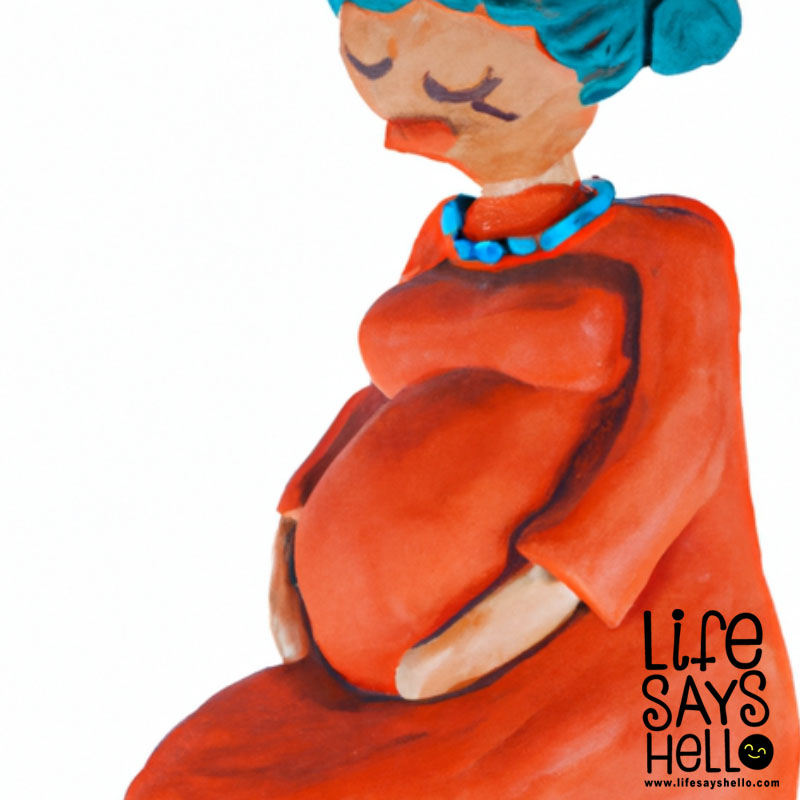Pregnancy at 40: Embracing Motherhood and Navigating Challenges for the 40-Year-Old Mom-to-Be

Are you a 40-year-old woman considering motherhood or already pregnant? This comprehensive guide will help you navigate the unique challenges and joys of pregnancy at 40, while debunking common myths and misconceptions.
Introduction
Pregnancy at 40 can be an incredibly rewarding and fulfilling experience, but it can also come with its own set of challenges and concerns.
In this comprehensive guide, we'll explore the realities of being a pregnant 40-year-old, dispelling myths and misconceptions, and providing valuable insights and advice to help you on your journey to motherhood. So, whether you're still considering pregnancy or already expecting, read on to learn more about what to expect and how to prepare for this exciting new chapter in your life.
Understanding the Fertility Landscape for 40-Year-Olds
It's important to understand the fertility landscape for women in their 40s, as this can help you make informed decisions and set realistic expectations for your journey to motherhood.
As women age, their fertility naturally declines, with a more significant drop after the age of 35. However, this doesn't mean that getting pregnant at 40 is impossible. In fact, many women in their 40s go on to have healthy pregnancies and babies. That said, it's essential to be aware of the factors that can impact fertility at this age, such as diminished ovarian reserve, egg quality, and underlying health conditions. Consultation with a fertility specialist can help you better understand your unique fertility situation and provide guidance on the best path forward.
Preparing for Pregnancy at 40
When you're preparing for pregnancy at 40, it's crucial to prioritize your preconception health and make lifestyle changes that can support a healthy pregnancy.
To give yourself the best chance of conceiving and maintaining a healthy pregnancy, consider making the following changes:
- Adopt a balanced, nutrient-rich diet to ensure you're getting all the essential vitamins and minerals your body needs.
- Begin taking prenatal vitamins, particularly folic acid, which can help prevent neural tube defects in your baby.
- Engage in regular exercise and maintain a healthy weight, as this can improve your overall health and fertility.
- Manage stress and prioritize mental health, as high stress levels can negatively impact fertility and pregnancy outcomes.
By making these changes, you'll be setting the stage for a healthier pregnancy and a smoother transition into motherhood.
Possible Challenges and Risks
While many women have healthy pregnancies at 40, it's essential to be aware of the potential challenges and risks associated with pregnancy at this age.
Some of the increased risks for pregnant women over 40 include:
- Gestational diabetes: This condition affects how your body processes sugar during pregnancy and can lead to complications for both you and your baby if not managed properly.
- Preeclampsia: A pregnancy complication characterized by high blood pressure and damage to organs, such as the liver and kidneys. Preeclampsia can lead to severe complications if left untreated.
- Chromosomal abnormalities: The risk of chromosomal abnormalities, such as Down syndrome, increases with maternal age.
- Preterm birth and low birth weight: Pregnancies at 40 are at a higher risk of preterm birth and low birth weight, which can lead to health issues for your baby.
It's important to work closely with your healthcare provider to monitor and manage these risks throughout your pregnancy.
Prenatal Care and Testing
Regular prenatal care and testing are crucial for ensuring the health and well-being of both you and your baby during your pregnancy at 40.
Your healthcare provider will likely recommend more frequent prenatal check-ups and specialized tests for pregnant women over 35. Some of these tests may include:
- Amniocentesis: A procedure that involves taking a small sample of the amniotic fluid surrounding your baby to test for genetic disorders and chromosomal abnormalities.
- Chorionic villus sampling (CVS): A test that involves taking a small sample of cells from the placenta to check for genetic disorders and chromosomal abnormalities.
These tests can provide valuable information about your baby's health and development and help you make informed decisions about your pregnancy and care.
Labor and Delivery Considerations
As you approach your due date, it's important to be aware of the unique labor and delivery considerations for pregnant women over 40.
During labor, your healthcare provider may recommend additional monitoring to ensure the safety of both you and your baby. This may include continuous fetal monitoring or more frequent checks of your baby's heart rate.
Additionally, women over 40 have a higher likelihood of requiring a cesarean section (C-section) due to potential complications during labor. It's essential to discuss your birth plan and preferences with your healthcare provider and be prepared for the possibility of a C-section if necessary.
Finally, make sure to explore your pain management options and discuss them with your healthcare provider to ensure a comfortable and safe labor and delivery experience.
Postpartum Care and Support
After giving birth, it's essential to focus on your physical recovery, emotional well-being, and the establishment of a strong support network to help you navigate the challenges of new motherhood.
Some key aspects of postpartum care and support for women over 40 include:
- Physical recovery: Give your body time to heal and recover from childbirth. Follow your healthcare provider's recommendations for postpartum care and activities.
- Emotional well-being: New motherhood can be emotionally challenging, and it's crucial to prioritize self-care and seek support from friends, family, or a mental health professional if needed.
- Breastfeeding: Breastfeeding can provide numerous benefits for both you and your baby, but it can also come with challenges. Seek guidance from a lactation consultant or support group to help you navigate any breastfeeding difficulties.
By focusing on your postpartum care and support, you'll be better equipped to handle the demands of new motherhood and enjoy this special time with your baby.
Success Stories and Encouragement
To inspire and encourage you on your journey as a pregnant 40-year-old, it's helpful to hear the success stories of other women who have had healthy pregnancies and babies at this age.
Many women in their 40s have gone on to have successful pregnancies and healthy babies, proving that age is just a number when it comes to motherhood. These stories can provide hope and motivation as you navigate your own pregnancy journey.
Additionally, consider seeking out support groups or online communities specifically for women who are pregnant at 40 or older. These groups can provide valuable advice, encouragement, and camaraderie as you embark on this exciting new chapter in your life.
Conclusion
Pregnancy at 40 can be a beautiful and rewarding experience, especially when you're armed with the right knowledge, support, and care.
By understanding the unique challenges and joys of pregnancy at this age, you'll be better prepared to navigate your journey to motherhood with confidence and grace. Remember to prioritize your health, seek guidance from your healthcare provider, and surround yourself with a strong support network. With the right care and support, you can embrace the incredible adventure of becoming a mom at 40.




Comments